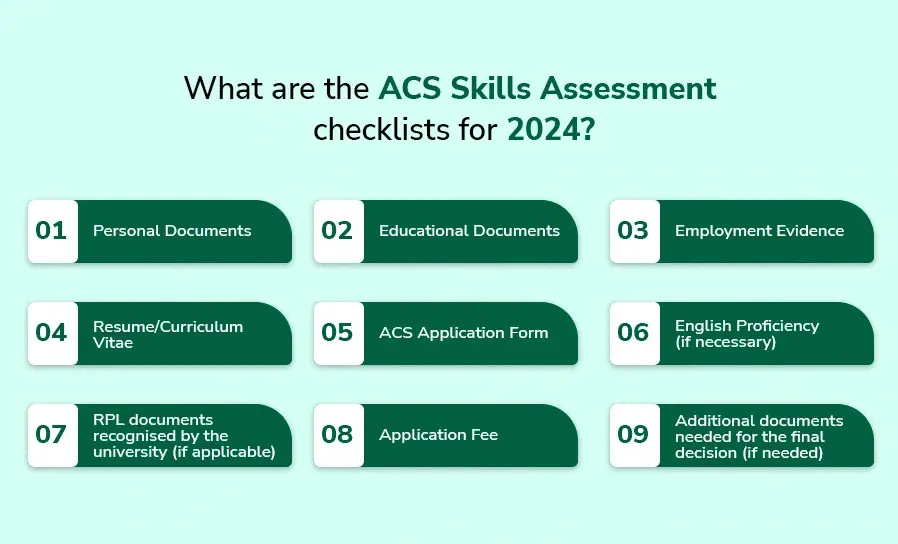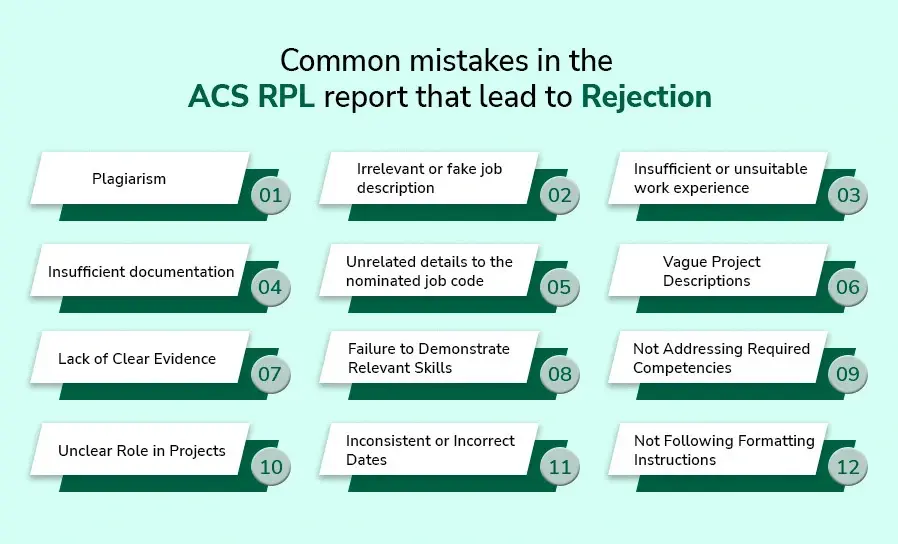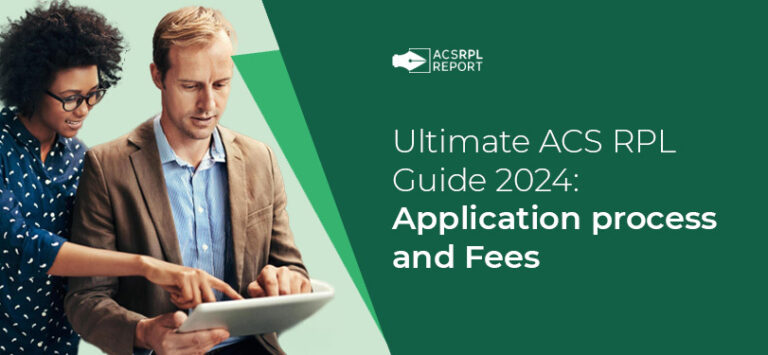Are you an IT professional dreaming of a career or permanent residency in Australia? The Australian Computer Society (ACS) is your gateway to achieving this goal.
The ACS Skill Assessment checks whether your skills match the Australian skilled migration needs. Without it, you’ll not be in a position to apply for the majority of IT-related visas.
You will have to forward your documents for assessment, including your education, employment reference letter, working experience, etc. The ACS then assesses your application to give an outcome that will show your qualifying status.
What is ACS skill assessment?
ACS Skills Assessment is a procedure of the Australian Computer Society to assess your skills for IT employment opportunities. It is crucial for skilled migration to Australia, especially due to the demand in the IT sector.
The assessment ensures your qualifications and experience align with Australian standards. It includes your education, work history, and sometimes a Recognition of Prior Learning (RPL) if needed.
ACS reviews your documents to determine if you qualify for the nominated occupation. Once the assessment is complete, the result will be provided for use in your visa application.
What is ACS RPL Australia?
RPL (Recognition of Prior Learning) in Australia lets you turn your work experience, skills, and informal learning into formal qualifications. It’s perfect for skilled migrants or professionals wanting to meet Australian standards without traditional study.
Simply provide evidence of your experience and get recognised for what you already know!
Purpose of Skill Assessment
The ACS skill assessment assists IT professionals in confirming qualifications and experience. Self-profiling ensures applicants provide appropriate credentials for the chosen profession, which is crucial in the migration process.
It checks your education, work experiences, and technical skills against the Australian Skilled Occupation List. It verifies your knowledge in your chosen field and assures that the acquired competence is market-oriented.
Preparing for the ACS skills assessment not only clarifies immigration requirements but also strengthens your application. Additionally, it identifies areas where further training may be needed based on the evaluator’s findings.
What are the ACS skill assessment guidelines?

Here’s a friendly guide to help you through the ACS Skills Assessment process.
1. Check Your Eligibility
- Make sure your occupation is one that ACS recognises.
- Select the right pathway for your assessment based on your qualifications and experience.
2. Prepare Your Documents
- Identity Proof
- A valid passport and any documents detailing name changes.
- Educational Qualifications: Your academic transcripts and degree certificates.
- Employment Evidence
- Detailed reference letters and proof of payment for each job you’ve held.
3. Submit Your Application
- Fill out the online application form available on the ACS website.
- Pay the assessment fee, which can differ based on the type of assessment you choose.
4. Document Verification
- ACS will carefully review your submitted documents to check authenticity, integrity, and relevance.
5. Assessment Outcome
- You will receive a result letter via email, sharing the outcome of your assessment.
If you are successful, this letter can be a valuable part of your visa application with the Department of Home Affairs.
What are the ACS skills assessment checklists for 2024?

The ACS Skills Assessment checklist provides an overview of the documents needed. It is designed for those applying as IT professionals for skilled migration to Australia.
1. Personal Documents
- A valid passport (a clear photo or scanned copy of the identification page).
- Originals of one passport-size photograph taken within the last six months.
- Any legal document that changes your name (if there was a change of name).
2. Educational Documents
- Certified/attested records of all academic qualifications
- Certificate of the degree obtained or completion letter of the course pursued.
3. Employment Evidence
- Reference letters must include the employer’s name, address, and contact details.
- State employment start and end dates, job titles, and duties that match the ANZSCO code.
- Specify hours worked (full-time/part-time) and provide evidence like payslips, tax returns, or bank statements.
4. Resume/Curriculum Vitae
- A new curriculum vitae that includes your educational background, skills, and experience.
5. ACS Application Form
- Fill in the ACS online application form.
6. English Proficiency (if necessary)
- IELTS/PTE test results (if it is requested by the university-accredited)
7. RPL documents recognised by the university (if applicable)
- RPL application form.
- Two detailed project reports.
8. Application Fee
- The receipt of payment for the ACS skill assessment.
9. Additional documents needed for the final decision (if needed)
- Evidence of self-employment in different periods.
- Employment record if undue reliance cannot be placed on written evidence: Statutory declaration or affidavit is required.
Make sure that all the documents are clean, certified copies, and uploaded in the right format Pixels (PDF).
Learn More: ✈️🦘🤩Explore ACS RPL Samples for a Successful Skills Assessment! ✈️🦘🤩
What is the ACS skill assessment process time?
In general, the periods required for the ACS skill assessment are approximately 8 to 12 weeks. The duration of this time frame depends on the workload of the application and the frequency of the submissions of the programmes.
Evaluations will also take a longer time, especially for applicants with other documents such as RPL reports. ACS basically takes its time and invests enough effort to review each of the applications in detail.
There are a few things that you can always do as an applicant to take advantage. Quick replies to any such ACS requests will surely reduce the waiting period.
The applicants will be notified once their skills have been assessed. Feel free to visit the ACS portal to see how your application is progressing. Make sure you provide all the necessary documents to avoid any delays in receiving your results.
What is the ACS Australia skill assessment fee?
The fee charged for ACS skill assessment depends on the type of assessment done. At present, about AUD 500 is required to pay for a basic skills recognition procedure.
The charging of extra fees may be done in case other additional services are demanded. The additional services may include options like the special RPL (Recognition of Prior Learning) assessments.
Know More: 🙋♂️👉✈️ Get Clarity on ACS RPL fee details as a Guide to Affordable Skill Assessments! ✈️👉🙋♂️
Common mistakes in the ACS RPL report that lead to rejection

1. Plagiarism
One common mistake is that learners copy information from sample reports instead of making it their own.
2. Irrelevant or fake job description
The required job description should be a fair estimation of the applicant’s real workload.
3. Insufficient or unsuitable work experience
Candidates lacking sufficient experience in the field are likely to be rejected.
4. Insufficient documentation
In some cases, the documentation required for assessment may be incomplete or missing, which can be the reason for rejection.
5. Unrelated details to the nominated job code
It refers to information or details that are not relevant or connected to the specific job code that has been assigned or referenced.
6. Vague Project Descriptions
A clear lack of detailed elaboration of projects, tasks, and technologies used constitutes a primary cause of rejection.
7. Lack of Clear Evidence
Lack of proper documents such as reference letters or project reports may act as a very negative factor within the application.
8. Failure to Demonstrate Relevant Skills
Failure to demonstrate relevant skills for ACS RPL means the applicant didn’t clearly show how their past work qualifies them for the role.
9. Not Addressing Required Competencies
The reports applicants submit for the RPL must demonstrate how they meet all the competencies outlined in the ACS guidelines. Not doing so may lead to rejection.
10. Unclear Role in Projects
If you don’t clearly explain your job and responsibilities in previous projects, it will lead to confusion and a likely negative evaluation.
11. Inconsistent or Incorrect Dates
Giving out confused or even wrong employment or project dates can raise questions of credibility about the applicant’s work experience.
12. Not Following Formatting Instructions
Failing to follow ACS formatting guidelines can result in a poorly presented application. This may lead to the application failure.
Explore More: 🔥✨🤑 Master the ACS RPL Report with Expert Tips for a Perfect Submission! 🤑✨🔥
Conclusion
The ACS Skills Assessment is a vital step for IT professionals aiming to migrate to Australia. It ensures your skills, qualifications, and work experience meet Australian standards, making you eligible for IT-related visas.
Proper preparation and understanding of the process can greatly enhance your chances of success.
To avoid rejection, it’s crucial to follow Australian Computer Society guidelines. You should provide accurate and complete documentation and demonstrate your skills precisely.
Addressing all required competencies and submitting well-detailed reports will strengthen your application and make it more competitive.
Finally, ensure that your application is well-organised, plagiarism-free, and responsive to ACS feedback. By doing so, you save time, minimise delays, and improve the likelihood of a positive outcome.
FAQs
1. What are the criteria for the ACS RPL skills assessment?
To qualify for ACS RPL, candidates need either eight years of relevant work experience without formal ICT (Information Communication Technology) education or six years with an unrelated degree.
They must submit detailed project reports showing ICT knowledge, along with a resume, work references, and proof of English proficiency. Applications are submitted through the ACS online portal.
2. How long will it take to get an ACS skill assessment?
The duration to complete an ACS skill assessment is usually between 8 and 10 weeks. However, if the ACS demands other documents or information, the time will take more than the above-stated time.
3. What are the benefits of RPL?
The ACS RPL (Recognition of Prior Learning) skill assessment offers numerous benefits for IT professionals aspiring to migrate to Australia.
a. Pathway for Non-ICT Qualifications
The ACS RPL (Recognition of Prior Learning) assessment allows applicants with non-ICT academic backgrounds to demonstrate their practical experience in the ICT field.
b. Supports Career Transition
It allows the postgraduate specialist with no prior education in the field of ICT to confirm acquired knowledge and competencies conforming to Australian standards.
c. Skilled Migration Eligibility
The ACS RPL assessment, when successful, provides applicants with skilled migration visas that enable them to work and live in Australia.
d. Recognition of Experience
It focuses on providing practical experience, helping to match the skills of experienced ICT professionals with the required competencies. This process involves sharing detailed information about personal projects and achievements to demonstrate relevant expertise.
e. Enhances Credibility
When applicants pass the RPL assessment, they gain the trust of employers in Australia as well as immigration authorities. They prove competence in the field.
These benefits make the ACS RPL a valuable process for IT professionals looking to enhance their career opportunities in Australia.
4. Who is eligible for the RPL?
To be eligible for the ACS RPL (Recognition of Prior Learning) assessment, one must meet these conditions.
a. Non-ICT Qualifications
Even those who aren’t holders of a degree in IT are welcome to apply. They must have at least six years of work experience in the field, eight years if no formal education credentials at all.
b. Work Experience in ICT sectors
You also have to prove your skills and experience in the actual projects. You have to present project reports and letters of reference. This will prove that your skills are as per the standards that are recognised in Australia for IT jobs.
c. Non-ICT Degree Holders
If you hold a degree in a non-ICT field, you can qualify by providing the necessary work experience and relevant skills through the RPL application.
In conclusion, the RPL is aimed at persons who have no ICT qualifications and who seek to go out to work with practical experience in the speciality.
5. What if the ACS skill assessment is rejected?
If your ACS skill assessment is denied, you have the option to request a reassessment within 90 days.
You must respond to the reasons for the denial and supply any necessary documentation or clarifications. Additionally, there is a charge for the reassessment.
6. Can I use RPL for skill assessment?
Yes, you can use RPL (Recognition of Prior Learning) for your ACS skill assessment, if you don’t have a formal ICT qualification. The RPL pathway is a fantastic way for you to showcase your valuable work experience.
With your detailed project reports and reference letters, you can do this. This will demonstrate your skills align with Australian standards for ICT jobs.
This option is open to those with non-ICT qualifications or anyone who may not have formal education in this area. It is the best way to highlight your practical knowledge and hands-on experience in ICT.
7. How long is ACS valid for?
Your result from the ACS skill assessment is valid for two years! During this time, feel free to include your assessment result in your visa application.



